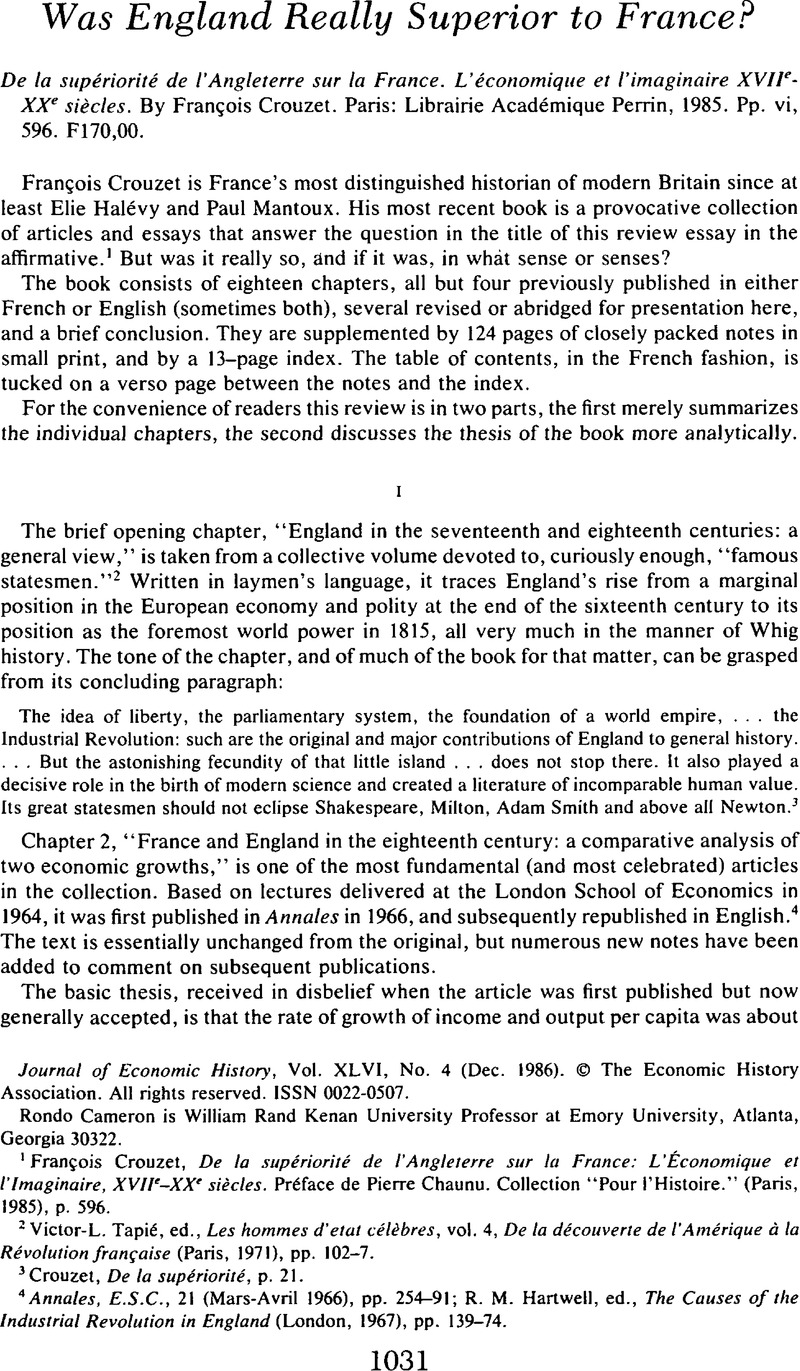No CrossRef data available.
Article contents
Was England Really Superior to France?
Review products
Published online by Cambridge University Press: 03 March 2009
Abstract

- Type
- Review Article
- Information
- Copyright
- Copyright © The Economic History Association 1986
References
1 Crouzet, François, De la supériorité de l' Angleterre sur la France: L'Économique er l' Imaginaire, XVIIe–XXe siècles. Préface de Pierre Chaunu. Collection “Pour l' Histoire.” (Paris, 1985), p. 596.Google Scholar
2 Tapié, Victor-L., ed., Les hommes d'etat célèbres, vol. 4, De la découverte de l' Amérique à la Révolution française (Paris, 1971), pp. 102–7.Google Scholar
3 Crouzet, De la supérioriré, p. 21.Google Scholar
4 Annales, E.S.C., 21 (Mars-Avril 1966), pp. 254–91; Hartwell, R. M., ed., The Causes of tile Industrial Revolution in England (London, 1967), pp. 139–74.Google Scholar
5 Crouzet, De la supériorité, p. 37.Google Scholar
6 Ibid., pp. 74–75.
7 Braudel, Fernand, Civilisation matérielle, économie ci capitalisme, XVe–XVIIIe siècle, vol. 3, Le temps du monde (Paris, 1979).Google Scholar
8 “The Sources of England's Wealth: Some French Views in the Eighteenth Century,” in Cottrell, P. L. and Aldcroft, D. H., eds., Shipping, Trade and Commerce: Essays in Memory of Ralph Davis (Leicester, 1981).Google Scholar
9 London, Methuen & Co.Google Scholar
10 Deuxième conférence iniernationale d'histoire économique. Aix-en-Provence, 1962 (Paris-Den Haag, 1965), pp. 589–642.Google Scholar
11 Williamson, Jeffrey G., “Why was British Growth So Slow during the Industrial Revolution?” this JOURNAL, 44 (09 1984), pp. 687–712.Google Scholar
12 “Towards an Export Economy: British Exports during the Industrial Revolution,” Explorations in Economic History, 17 (01 1980), pp. 48–93.CrossRefGoogle Scholar
13 “Cliométne et révolution industrielle,” Histoire, Économie, el Société (1983), pp. 607–24.Google Scholar
14 Crouzet, De la supériorité, p. 220.Google Scholar
15 Crouzet, François, ed., Les hommes d'état célèbres, vol. 5, De la Révolution Française à la première guerre mondiale (Paris, 1975), pp. 52–69.Google Scholar
16 “Les Conséquences économiques de la Révolution. A propos d'un inédit de Sir Francis d' Ivernois,” Annales hisroriques de la Révolution Française, 34 (1962), pp. 182–217 and 336–62.Google Scholar
17 Crouzet, De la supériorité, p. 296.Google Scholar
18 Kindleberger, C. P. and di Tella, Guido, eds., Economics in the Long View: Essays in Honour of W. W. Rostow (London, 1982), vol. 2, pp. 44–66.Google Scholar
19 Youngson, A. J., ed., Economic Development in the Long Run (London, 1972), pp. 98–125.Google Scholar
20 Crouzet, De la supériorité, p. 341.Google Scholar
21 Ibid., p. 54.
22 Annales E.S.C., 19 (Mars-Avril 1964), pp. 281–310.Google Scholar
23 Crouzet, De la supériorité, p. 562.Google Scholar
24 Trenard, Louis, ed., Charbon et sciences humaines. Actes du colloqué organisé par la Faculté des Leures de l' Université de Lille en mai 1963 (Paris-Den Haag, 1966), pp. 173–205.Google Scholar
25 Crouzet, De la supériorité, p. 405.Google Scholar
26 Revue Historique, 254 (Juillet-Septembre 1975), pp. 105–34.Google Scholar
27 Bédarida, François, et al. , eds., De Guillaume le Conquérant au Marché Commun. Dix siècles de l'histoire franco-britannique (Paris, 1979).Google Scholar
28 Crouzet, De la supériorité, p. 454.Google Scholar
29 Harley, C. Knick, “British Industrialization before 1841: Evidence of Slower Growth during the Industrial Revolution,” this JOURNAL, 42 (06 1982), pp. 267–89;Google ScholarCrafts, N. F. R., “British Economic Growth, 1700–1831: A Review of the Evidence,” Economic History Review, 2nd ser., 36 (05 1983), pp. 177–99;CrossRefGoogle ScholarWilliamson, Jeffrey G., “Why was British Growth So Slow?”; Floud, Roderick and McCloskey, Donald, eds., The Economic History of Britain since 1700, 2 vols. (Cambridge, 1981).Google Scholar See also Cameron, Rondo, “The Industrial Revolution: A Misnomer,” in Schneider, Jürgen, ed., Wirtschafskräfte und Wirtschaftswege: Festschrift für Hermann Kellenbenz (Stuttgart, 1981), vol. 5, pp. 367–76;Google Scholar and “A New View of European Industrialization,” Economic History Review, 2nd ser., 38 (Feb. 1985), pp. 1–23. The latter article, which appeared a few months before he began reading proofs on his book, is primarily concerned with one of his central theses.Google Scholar


